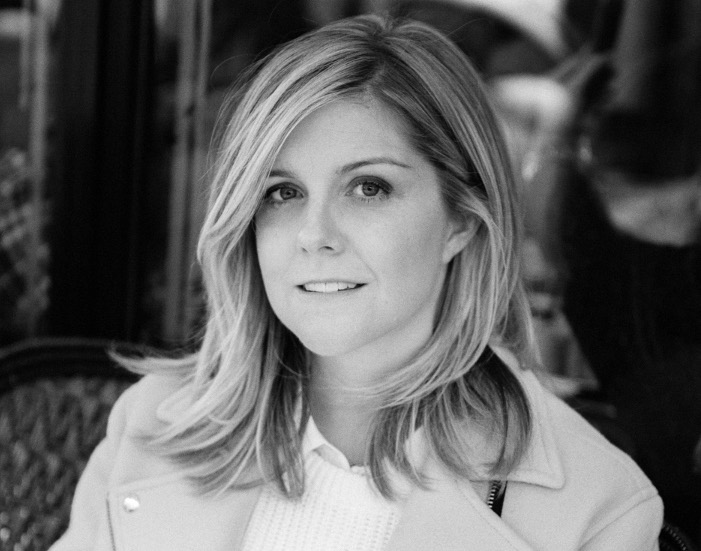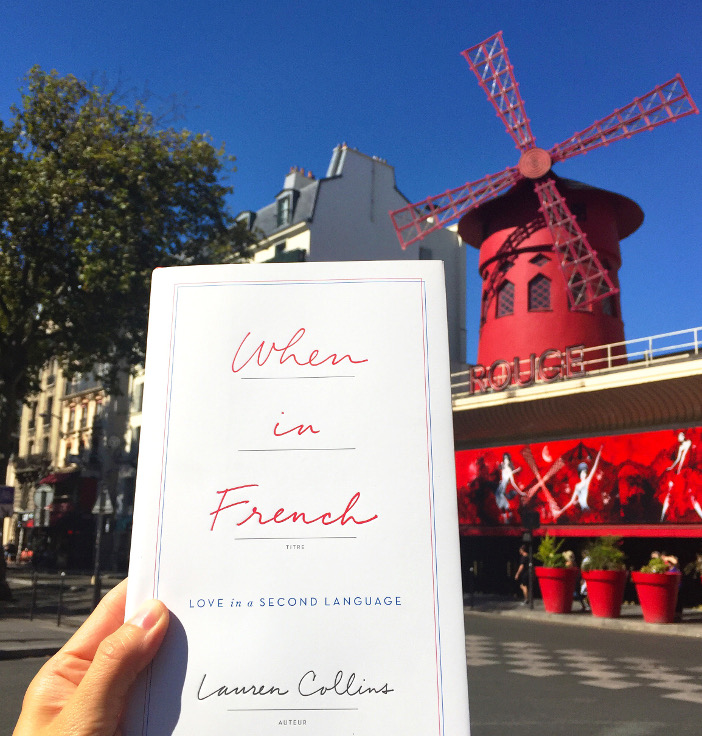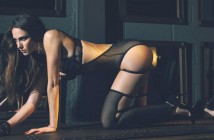
Lauren Collins has been in Paris less than a year, but she already speaks French better than I do. Which, frankly, is embarrassing because French and I have a long history: 4 years in high school, junior-year semester abroad in Paris, 8 years living in France. Lauren took her very first French class in Geneva about three years ago. She’s now speaks easily with a soft accent that’s not cringingly American.
That journey, from mute new expat to fluent French speaker, is the frame from which she parses the intimacies of language and culture in her debut memoir, When in French: Love in a Second Language. The book is insightful and funny and comes out today! (It’s one of our Fall Book Picks.)
As a staff writer for The New Yorker, Lauren is usually on the other side of the iPhone mic, profiling regular folk like Michelle Obama and Banksy. Read her stories and you will be looking up words you don’t know (her vocabulary is better, too), but you’ll appreciate her wicked humor and her canny observations. Lauren graciously agreed to this interview and like a good journalist, often turned the questions back to me. We had a fantastic conversation about everything from bad French moms to government-issued lube to how to read Proust.
What struck me about Lauren, apart from her ferocious intelligence and her Southern generosity (she grew up in North Carolina), is the force of her will. As any Anglophone expat in Paris will tell you, learning French is… difficult. Not only because of the grammar and the many exceptions to the rule, but because it’s so easy to coast on English, wherever you are in the world. To attain French fluency in three years is whoa, but then, this is a woman who wrote her book while pregnant with her first baby. I think Lauren Collins can probably do anything she sets out to.
You’ve been an expat since 2010 in London. For someone who didn’t have a passport until college, how is life abroad? Do you want to go back to the States?
I still don’t know why I left New York in 2010. It was really uncharacteristic for me. I’ve always been the organization kid. Not only did I never take off and get a backpack and go bumming around the Eurorail, but I never wanted to. I’ve always played it really safe. It never crossed my mind that I’d go live in another country. But as unlikely as it was, once I went, I never looked back.
Barring extraordinary circumstances, I’m staying in Paris. Vacation in the US suffices. If I lived in the States, I’m still going to be a plane ride away from my family [who are in North Carolina]. Maybe it would be different if my family lived in New York and it was this stark choice between life abroad or life with my mom right around the corner, but it’s not.
How do you find life in France? Was it an easy transition after London and Geneva? What surprises you about living here?
I can conceivably imagine it being a difficult transition if I had come directly from London and it was my first experience of being in a different language. But because I came here from Geneva, my experience was sheer bliss and ecstasy—walking out that door every day and being in Paris. I think I’m safely past what would qualify as the honeymoon period and I’m really happy to be living here. I have no gripes about Paris. It would be a lot more interesting if I did. I have a lot of gripes about Geneva! Paris is a total dream. What was surprising to me is that when you think about Paris, it’s so much this pie-in-the-sky fantasy. But I find it’s a great city to have a family and a real life and to be able to afford an apartment.
How long was this memoir in the making? In practical terms, you’re a writer at The New Yorker as well as a new mom, when did you write this book?
I wrote it while I was pregnant, living in Switzerland. The baby’s due date was the perfect deadline! All told, it was two years. I signed the [book] contract in spring 2014 and here we are. The idea was growing and growing and I was kind of ignoring it. By the time I turned around and faced it, it was there fully hatched. So it was just getting it down at that point. I realized afterwards that I had been increasingly interested in and fascinated by language. And then the French language because that was what was animating me in my personal life. As a writer, of course that always winds up spilling over into your work, for better or for worse.
Where are you with your French now? Do you consider yourself fluent?
I feel like it’s one of those things you can never say about yourself. It’s like asking someone if they’re funny. “I’m so funny!” I’m probably just fluent. You reach a level where you can do the stuff you need to, maybe not with a great deal of flair and elegance, but then I think it’s hard to bump yourself up to the next level.
I initially had the catalyst of my husband’s family. Because they don’t speak English, I knew learning French was something I had to do if I wanted to be part of the family, so that was a big motivator. And of course, having a child. Maybe I’m just more of a control freak than other people, but I was really freaked out by the notion of having no grounding in the language of my daughter’s daily life.
It’s hard to keep going once you’ve reached proficiency, once going to the grocery store isn’t a problem. You need another event, a life catalyst to get you to the next level.

In When in French, you write about how people like to imagine themselves, reinvent themselves in a foreign language. I read something recently about how bilinguals/multilinguals change personalities depending on the language they’re using. Do you feel like a different person in French? How is French Lauren different from American Lauren?
I’m recognizable to myself in French, but I feel like a more disciplined person. I think you can attribute some of that to culture and the rigid perfectionism of French women. But I also think there is a direct link to language, to speaking in a second language, because you do have to put everything through the ringer of thought before saying it. I feel like I can pull off a certain straightfacedness in French that I couldn’t necessarily in English.
So you’re more serious in French?
I think you have a certain freedom in being decontextualized in a different culture and language. In English, to most people, I’m identifiably a blonde chick from the South. Not so here. Maybe I have a little more freedom to try out personas that wouldn’t make sense back home. I don’t really see myself calling something “execrable” or “formidable” in my American persona. The other thing is coming to French at a certain age. Maybe that’s why I feel a little more grownup in French occasionally. It’s a language where I have no childhood.
How do you feel about raising your daughter in France? I’m trying to raise a feminist daughter and son here and sometimes I think it’s such a battle because I feel like France is behind the US when it comes to feminism and equality.
I can’t say I totally agree with you. Have you read Elisabeth Badinter’s The Conflict? I’m really allergic to parenting literature. I started reading it when I had my daughter, but it all made me incredibly stressed so I dropped it quick. The Conflict is a polemic about feminism and motherhood and the contemporary, unquestioning glorification of how everything “natural” plays into this untenable idea of a woman. It’s the lodestar. Badinter points out that France is anomalous in Europe for its high birth rate and what she calls the paradox of being allowed to be a quote-unquote “Bad Mother.” Because of it, women here actually want to be mothers.
Do you think Americans look at French moms as bad, though? There’s so much out there about how French parenting is the best.
I think it’s about having the permission to be a bad mother. You don’t have to breastfeed. You can go back to work, but it is the other extreme. There’s a lot of pressure on women here and the idea of femininity is definitely different. That was very hard for me and something I write about in the book. Why does my husband say out loud that he prefers when I wear makeup? Why is it so important to him?
It’s a steep learning curve to understand how important feminine presentation is in French society. I go back and forth on that. At first I was like, This is bullshit. That’s how we are raised as Americans—or when you’re trying to raise a feminist daughter. Your appearance doesn’t matter. So at first, I found it oppressive and morally suspect somehow but I’ve also come to grudgingly notice, no matter what my philosophical feelings are about it, that I feel better when I look good. Which is funny. Put into practice, I don’t think it’s a bad thing necessarily. If I felt crushing pressure it would be a bad thing. American society sets up these expectations, but it’s all on you to make them happen so it can feel really impossible. Whereas French society sets up these expectations and there’s a lot of social structure to help you.
Right, like the réeducation du périnée (mandatory physical therapy for your v-jay after giving birth). After I had my son, I went to the gynecologist and she gave me a prescription for lube because it’s good for le couple to start having sex again. I told everyone, “The French government is paying for my lube!”
I like that, though. I went to the gynecologist and she said, “You’re going out with your husband alone.” It was with almost all the serious of writing a prescription: You and your husband need to spend time alone together. I think it’s pretty great. You have a figure of some authority telling you it’s good for you—rather than feeling if you’re taking that little piece for yourself, you’re transgressing.
There’s been more, much-needed conversation about sexism in everything—including literature. I’m thinking about Claire Vaye Watkins’ essay, “On Pandering.” In one part, she said how becoming a mother made her feel like she wasn’t an artist in some way. The things she wrote about now were cute as opposed to serious and literary. Then there was Lauren Goff who said in a New Yorker interview that she won’t subject herself to playdates and will lock herself away from her family to write. Which rubbed a lot of mothers, including me, the wrong way. What do you think about motherhood and the writing life? Has motherhood changed how or what you write?
It’s interesting because there is this little flourishing of motherhood lit. Rivka Galchen’s Little Labors; Jessica Winter’s Break in Case of Emergency. The paragon is Jenny Offill’s Department of Speculation. It’s short and completely amazing. She has this formulation that she always thought she was going to be this art monster. Meaning someone who locks herself in her room and produces art to the detriment of everything else. And then she has a child and it obviously doesn’t work out like that.
With motherhood, I think you lose some things and you gain some things. And maybe in the final balance, you even come out a little bit ahead. The things you lose are practical and logistical. You lose time. On the most obvious level, you gain material. You have access to a new world. It’s like getting interested in language. You’re having new experiences, which I think is always good for creativity. I don’t really subscribe to the notion that motherhood is a transformative experience, in the sense that I feel continuity between myself before and after. I don’t think it has to be B.C./A.D. Also, people attribute these changes in themselves solely to motherhood while neglecting the fact that they’re also aging. But whatever you’re attributing it to, you do start to see things differently at certain points in life. The richer your life experiences, however you choose for that to happen, the more you’re able to relate to people. As a journalist, you’re able to elicit or notice different things and I’m sure for people in other fields as well.
I don’t feel an opposition between motherhood and work. I feel pressed for time. But some of what I’ve lost as a mother, I’ve gained in being an expat. I don’t have as many demands on my time as I would if I lived near my family, near my oldest friends, my employer. I think being an expat gives you that little bit of time. That said, you whittle half of it away wondering what everyone’s doing back home.
You’ve profiled people like Donatella Versace and Banksy. (By the way, is he the dude from Massive Attack?) Who is your dream interview?
I have to reserve judgment on Banksy/Massive Attack until I delve into it much further, but that was definitely a fun story to do. I was really young and I basically showed up in London like, “Banksy, where are you?” My dream interview is Serena Fucking Williams!
Aside from When In French, do you have any book recommends for fall?
I’m reading Negroland by Margo Jefferson, which is a memoir about growing up in the black upper middle class of 1960s America. I just finished Nadja Spiegelman’s memoir, I’m Supposed to Protect You From All This. It’s phenomenal. You have to read it. She’s from New York, the daughter of a French mother and American father, and ends up moving to Paris where her mother grew up to investigate all these family secrets in the maternal line. It’s bold. She really goes there. I just read Lauren Elkin’s book Flâneuse, which is about women walking the city in Paris and New York.
I’m in a great reading group at the American Library and we’re reading a volume of In Search of Lost Time. Proust has this reputation for being really abstruse and inaccessible. He is so much more accessible if you can sit there with no distractions. Take some time to acclimate being in the atmosphere of Proust. I make so much more headway when I don’t have my phone with me. Proust especially suffers from our modern ailment of multitasking. It’s very hard unless you can lock yourself in a room with no electrical outlet.
Photo of Lauren by Philip Andelman




4 Comments
Pingback: Promiscuous Reader: Fall Book Picks
You find the best interviews. I love reading about these fascinating people who I can also relate to as women, expats, working mothers, and creatives. Makes me feel not alone in the pursuit of it all. Also; feminism in France – what a complex issue! Like Lauren, I certainly go back and forth on my feelings about it. That said, I have loved the journey of embracing the sexy, as French women do so well. Yes, it does make us feel better. Other thing – bad moms. I’m so happy to be away from the American obsession of being an uber mom. How ironic that us feminist Americans get our panties in a knot if we can’t pull off being a super mom. Lastly – great book suggestions in this article. Thanks again!
Thanks, Rachel! So glad you enjoy them. I know, there definitely needs to be more conversation around feminism in France because it’s way less direct than the US, but not always a bad thing, either. Btw, how’s the working out? I got into running so haven’t gone to a class in ages…
I found the Somuchmore card to be better for those who like the gym. My favorite workouts are ballet classes and swimming. Those options, especially close to me, were pretty scarce. I’d hit my quota, then wasn’t thrilled about the leftover options. But I’m particular, and I do think the Somuchmore card is beneficial in a lot of ways. I did discover pole dancing, which I think I could really get in to as well. I’m glad I gave it a trial month. Now I’m signed up for dance classes and loving it. Running, however, is of the devil – but it’s free, which is fabulous! I tried to be a Parc Monceau runner, but I just can’t 😉